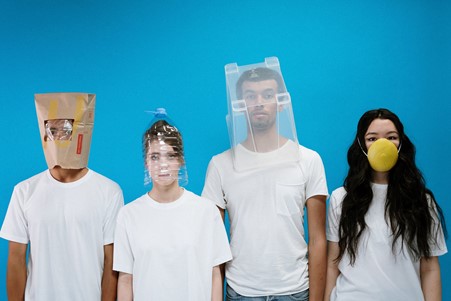The sustainable purchasing movement that wages a war on single-use met its match when Covid-19 hit. After 18 months of disposable face masks and takeout boxes, what can brands learn from the ways environmentally conscious consumers have changed their approach to sustainability in a pandemic?
During the Covid 19 lockdowns, our food came in shopping bags, recipe boxes, and takeout containers, our drinks came in cans and bottles of all shapes and sizes, and our bins were filled up with tissues, wipes, and hand gel containers. Staying healthy and safe during the pandemic came with a heavy environmental cost, which continues 18 months after the UK entered the first lockdown.
This year’s plastic-free July was understated; reusable fabric masks were crushed under the literal tons of PPE and cleaning products enlisted to help win this country’s fight against Covid 19. Our aim to purchase responsibly and protect the needs of future generations whilst we meet our own could not square up to the immediate challenges of the pandemic; the old approach to sustainability can’t survive the economy and practicalities of a world gripped by Covid 19. Some brands have given consumers ethical options in this new single-use normal, such as the ethical clothing brand Birdsong, by making re-usable masks from off-cuts. But this is a drop in the ocean against the consumer mindset shift where hygiene trumps everything, and re-usable can be seen as a shorthand for unsafe.
While the pandemic has elevated disposable materials from convenience to necessity, not all has been lost when it comes to the conscious purchasing movement. With more time to think about purchases, and a shift towards online ordering and engaging with D2C brands, many have had their eyes opens to smaller, more ethical brands and products. Simon Griffiths, CEO of largely D2C ethical toilet roll company Who Gives a Crap recalls how in March 2020, “The company did twice the number of sales, then five times, then 12 times – purely from word of mouth” (Source: CEO Magazine), and the brand has worked hard to demonstrate that their TP is just as good value as the supermarkets. New takes on sustainability take the form of shopping locally, supporting small businesses, and making more considered purchases, and we’re yet to see how a forced break-in fast-paced consumerism impacts long-term views, if at all.
The IPCC’s ‘Code Red’ report which came out this week as reaffirmed the urgent need for action and environmentalists may be dismayed that ensuring our safety meant choking our society with disposable plastics. Lockdown has allowed some ethical brands to flourish, and show some consumers that ethics doesn’t need to equal expensive. But if we really want to make a change, brands need to combat the problematic notion that sustainable and ethical consumption is a luxury afforded only to those who can afford premium fees for environmentally conscious brands at high price points.
Genuine and impactful solutions to the climate emergency will involve making sustainability accessible, because whilst market research company Nielsen report that 66% of global customers surveyed are willing to pay more for sustainable goods, it is important that everyone is offered the chance to do their bit without having to reach deeper into pockets. Whether it’s through environmentally transparent Direct to Consumer channels, or something entirely new, today’s brands are faced with the challenge of rethinking approaches to sustainability that don’t defer to the tired or inadequate crutches of premiumization and greenwashing, and instead are effective without being exclusive.


